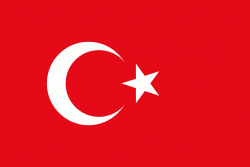Mudurnu
Mudurnu is a small town and a district of Bolu Province in the Black Sea region of Turkey, 52 km south-west of the city of Bolu. It covers an area of 1,349 km², and the population (2011) is 20,528 of which 4,936 live in the town of Mudurnu. , the mayor was Mehmet İnegöl (CHP).
The town has a long history and the name Mudurnu comes from the Byzantine princess Modrene (Μωδρηνή in Byzantine Greek), and the ruins of the Byzantine castle can still be seen above the town. In the 8th century AD, the forces of the Byzantine usurper Artabasdos, commanded by his son Niketas, were defeated at or near this location by the army of the legitimate emperor Constantine V, before being defeated again at Chrysopolis, the same location where Constantine the Great defeated his Eastern rival Licinius.
In the late 19th and early 20th century, Mudurnu was part of the Kastamonu Vilayet of the Ottoman Empire.
This is an attractive district of forest and mountain. Mudurnu itself is a historical town with a number of well-preserved Ottoman Empire period houses. A portion of the centre of town has been declared an Historic Preservation District ("Kentsel Sit Alanı").
In 1920, during the Nationalists' push to gain control over the country, İbrahim Çolak with the Kuva-yi Milliye besieged forces loyal to the Porte for three days, May 13 to 15, before taking the town.
The town has a long history and the name Mudurnu comes from the Byzantine princess Modrene (Μωδρηνή in Byzantine Greek), and the ruins of the Byzantine castle can still be seen above the town. In the 8th century AD, the forces of the Byzantine usurper Artabasdos, commanded by his son Niketas, were defeated at or near this location by the army of the legitimate emperor Constantine V, before being defeated again at Chrysopolis, the same location where Constantine the Great defeated his Eastern rival Licinius.
In the late 19th and early 20th century, Mudurnu was part of the Kastamonu Vilayet of the Ottoman Empire.
This is an attractive district of forest and mountain. Mudurnu itself is a historical town with a number of well-preserved Ottoman Empire period houses. A portion of the centre of town has been declared an Historic Preservation District ("Kentsel Sit Alanı").
In 1920, during the Nationalists' push to gain control over the country, İbrahim Çolak with the Kuva-yi Milliye besieged forces loyal to the Porte for three days, May 13 to 15, before taking the town.
Map - Mudurnu
Map
Country - Turkey
 |
|
| Flag of Turkey | |
One of the world's earliest permanently settled regions, present-day Turkey was home to important Neolithic sites like Göbekli Tepe, and was inhabited by ancient civilisations including the Hattians, Hittites, Anatolian peoples, Mycenaean Greeks, Persians and others. Following the conquests of Alexander the Great which started the Hellenistic period, most of the ancient regions in modern Turkey were culturally Hellenised, which continued during the Byzantine era. The Seljuk Turks began migrating in the 11th century, and the Sultanate of Rum ruled Anatolia until the Mongol invasion in 1243, when it disintegrated into small Turkish principalities. Beginning in the late 13th century, the Ottomans united the principalities and conquered the Balkans, and the Turkification of Anatolia increased during the Ottoman period. After Mehmed II conquered Constantinople (Istanbul) in 1453, Ottoman expansion continued under Selim I. During the reign of Suleiman the Magnificent, the Ottoman Empire became a global power. From the late 18th century onwards, the empire's power declined with a gradual loss of territories. Mahmud II started a period of modernisation in the early 19th century. The Young Turk Revolution of 1908 restricted the authority of the Sultan and restored the Ottoman Parliament after a 30-year suspension, ushering the empire into a multi-party period. The 1913 coup d'état put the country under the control of the Three Pashas, who facilitated the Empire's entry into World War I as part of the Central Powers in 1914. During the war, the Ottoman government committed genocides against its Armenian, Greek and Assyrian subjects. After its defeat in the war, the Ottoman Empire was partitioned.
Currency / Language
| ISO | Currency | Symbol | Significant figures |
|---|---|---|---|
| TRY | Turkish lira | ₺ | 2 |
| ISO | Language |
|---|---|
| AV | Avar language |
| AZ | Azerbaijani language |
| KU | Kurdish language |
| TR | Turkish language |















